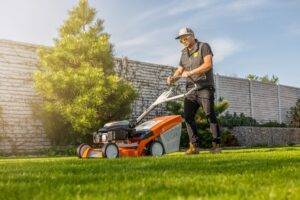<?xml encoding=”utf-8″ ?????????>
Eco-friendly lawn care is the way to lawn care where none of our activities harm the environment as there is a reduction in the carbon footprint and greenhouse gas emission.
The eco-friendly practices are not limited to what kind of plants we are growing in our garden but also involve lawn care practices that are usually not eco-friendly.
Look around, mostly we will not be seeing the lush home garden London is mostly covering the conventional plain turf lawns. In this article, we have included simple tips that will help you to get a greener lawn while having a non-significant impact on the environment.
Tips for Eco-friendly Lawn Care
Fostering a lawn in your home has many health benefits. It nurtures a healthy place to relax, improves the air quality, and provides a place to grow organic fruits and vegetables. However, sticking to eco-friendly practices is crucial, so here is how our experts recommend you go for lawn care in an eco-friendly way.
Overseed the Lawn Each Year
People are unaware of the magic of overseeding the lawn and ignore the issue when their lawns continue to lose their growth and density and they are left with a thin and rough garden that is good for nothing. The weeds overpower your garden and deteriorate the soil quality and even when you try to recover your garden, it is of no use.
Therefore, we advise our customers to oversee their home lawns at least once a year in spring or fall. While overseeding, you need to look at the type of seeds you are using. Go for the local options as they are adapted to the local weather and do not require additional water and fertilizers and they are also resistant to the local pathogens so your lawn remains free of pests and weeds.
Mow the Lawn the Right Way
Many people go for mowing their lawns once they observe any issue as mowing is the perfect way to ensure the sustainability of a lawn. However, you need to be aware of the right method of mowing so you get the desired outcomes of keeping the pests and weeds away as the wrong practices make your garden more vulnerable to such attacks.
Before starting to mow, make sure that the blades are sharp to make clean cuts rather than damaging the blades. Are you wondering how much length of the grass you need to cut? Well! The rule of thirds says the cuts should not exceed one-third of the length of the blade. However, different grass types have different mowing requirements. Consult with other gardeners or the internet to find out about yours.
Feed Your Soil
You may need to feed your soil to get the lush and green garden. Do not start adding the fertilizers blindly as you need to run a soil test to find what your soil needs. Most of the fertilizers contain phosphorus and you only need to use them if your soil test recommends so. Otherwise, you are damaging the soil instead of healing it.
Fertilize at the right time according to your grass’s nature and use only as much quantity as recommended by the specialist after the soil test. Moreover, switch to organic fertilizers as they serve the same purposes of improving soil quality and structure and replenishing the soil beneficial microorganisms but don’t cost the environment health as the inorganic fertilizers do.
Don’t Bag Your Leaves or Grass Clippings
In the past, you may have been like the people who bag their leaves and grass clipping after the trimming sessions and leave them on the sidewalk waiting for the scheduled collections. This is the common practice worldwide that not only removes the nutritious items from their original spot causing them to rot in the landfills, but also releases the greenhouse gases that cause soil pollution and damage the ozone layer.
Therefore, instead of bagging them, switch to eco-friendly practices. Convert your leaves and grass clippings to nutritional mulch for supporting the growth of the plants in your home garden. You can also compost them to create nutrient-rich soil for a healthy and sustainable garden. You can also leave the grass clippings on their own to let them decompose into the micronutrients.
Final Words
Eco-friendly alternatives are always available for all kinds of indoor and outdoor activities that impact our nature. The above tips will help you to create a sustainable home lawn that is not harming the environment. Mother Nature owes us, so we need to be responsible to let it flourish healthfully. Visit this site to learn more about lawn care practices.
